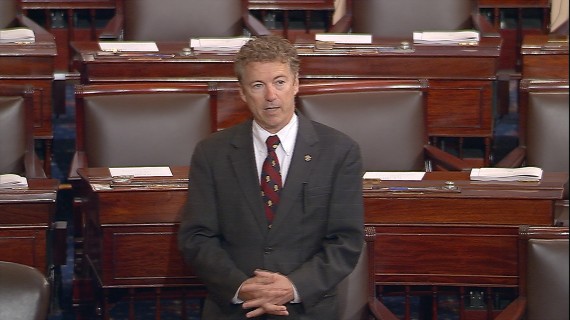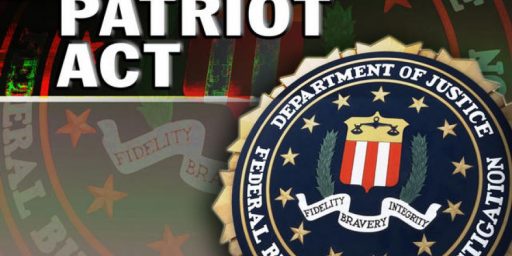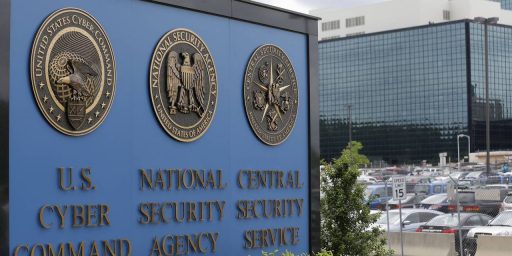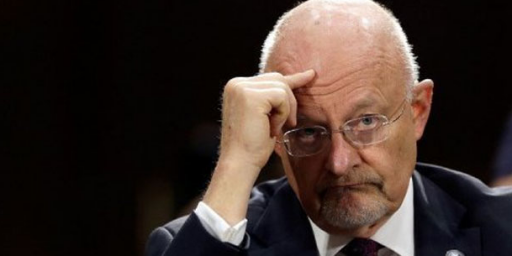Rand Paul Holds The Senate Floor To Talk About PATRIOT Act Renewal, Civil Liberties
Rand Paul held the Senate floor for nearly twelve hours yesterday to talk about the PATRIOT Act, but it's unclear if he accomplished anything.
With the Senate hoping to wind down its business by the end of the week before heading off on a week-long Memorial Day break, Kentucky Senator Rand Paul took to the floor yesterday to talk about the renewal of the PATRIOT Act in a speech that lasted nearly eleven hours, but it’s unclear if he actually accomplished anything:
Sen. Rand Paul spent most of Wednesday talking.
Paul took to the Senate floor at 1:18 p.m. Wednesday, interrupting a debate on a trade bill, to speak against a reauthorization of the Patriot Act. With the exception of breaks to allow colleagues to speak, he talked, and stood, for nearly 11 hours before yielding the floor just before midnight.
The Kentucky Republican’s marathon seizure of the Senate came after a week of repeatedly threatening to filibuster a reauthorization of the Patriot Act — a fight he conceded Monday he cannot win, because he does not have the votes.
“Are you really willing to give up your liberty for security?” Paul asked.
Paul spoke for about 2 1/2 hours before he got help from Sen. Ron Wyden (D-Ore.), with whom Paul has crafted his planned opposition. The two went back and forth asking each other questions — very, very long questions — about surveillance and the collection of bulk records.
Paul has been here before, rocketing to prominence in 2013 after speaking for 13 hours on the Senate floor — and vowing in his new book to wear tennis shoes the next time he filibustered. Last time, he had help from a large group of Senate colleagues. This time, he had a much smaller group by his side.
Sen. Mike Lee (R-Utah) took to the floor, as did Sens. Martin Heinrich (D-N.M.) and Steve Daines (R-Mont.). Sen. Joe Manchin III (D-W.Va.) joined Paul later in the evening. And four additional Democrats gave Paul a hand later Wednesday night: Sens. Richard Blumenthal (Conn.), Maria Cantwell (Wash.), Christopher A. Coons (Del.) and Jon Tester (Mont.)
Late Wednesday night Sens. Ted Cruz (R-Tex.) and Marco Rubio (R-Fla.), two of his competitors for the GOP presidential nomination, showed up in the chamber. Cruz presided over the body and, when done, spoke on the floor, urging colleagues to support the USA Freedom Act. Rubio presided and appeared to be engrossed in a magazine. Both men spoke at length during Paul’s 2013 filibuster.
Wednesday’s speech was poised to be a potential inflection point for Paul’s presidential campaign as, after a series of early stumbles, he seized the moment to very publicly distinguish himself from his competitors — and gauge whether a hawkish party would take to his message that there should be greater limits on government surveillance. As he began speaking, Paul’s team blasted out e-mails and issued a flurry of tweets urging supporters to “#StandWithRand,” and it continued to promote Paul’s speech all night. A group of about 30 Paul supporters gathered outside the Senate on Wednesday evening, waving signs from Paul’s presidential campaign.
And the candidate asked people to imagine a commander in chief whose policies would sound much like his own. “Let’s say tomorrow we elected a president who ended the bulk collection of data,” he said. “Let’s just say it happened.”
He spoke about the bulk collection of data. He spoke about civil forfeiture. He spoke about Section 213 of the Patriot Act, “this whole sneak-and-peek” that allows the government to come into a person’s house. He spoke about criminal justice. And spying. And a 1928 court case. And the Ninth Amendment. Every half-hour or so a new stenographer came over to stand by Paul’s desk, relieving the previous one.
Most of all, Paul spoke about how the Patriot Act allows for the collection of bulk surveillance. “We should be in open rebellion, saying enough’s enough,” he said.“Where’s the outrage?” he asked.
Many in the media referred to Paul’s speech as a ‘filibuster,” just as they did for his speech back in 2013 about U.S. drone policy, Bernie Sanders’ stemwinder over tax policy, and Ted Cruz’s speech during a Senate debate over the government shutdown in October 2013. In reality, of course, none of those were actual filibusters in that they weren’t really directed to stopping debate on any specific legislation, or even on the legislation that was the subject matter of the speech itself, and that was largely true of yesterday’s speech as well. In each of those, case Senators were holding the floor during what effectively was Senate ‘dead time’ that was required to elapse before the next step in the legislative process could proceed. As Mike DeBonis explained in The Washington Post yesterday, the most that Paul could have accomplished yesterday would have been to hold the floor long enough to mess up Mitch McConnell’s carefully planned calendar, which currently includes plans for the Senate to consider and vote on both the issue of renewing the PATRIOT Act. The Senate is scheduled to take the first of its votes on the Trans Pacific Partnership today, and McConnell was supposed to file for cloture on the PATRIOT Act shortly thereafter. Had Paul held the floor past midnight, he would have upset those plans. But, he didn’t hold the floor past midnight so that’s not going to happen. Instead, the Senate’s business will move forward and there will be a vote of some kind on PATRIOT Act renewal, although it’s entirely unclear what’s actually going to happen.
This isn’t to say that Paul’s speech was entirely without value. While it was ongoing, Reason’s Scott Shackford provided a fairly good explanation of what Paul, along Oregon Senator Ron Wyden, was really seeking to accomplish:
Paul and Wyden do have a specific aim in mind beyond just keeping Section 215 of the PATRIOT Act from being renewed as is. What they want, Paul has explained during the filibuster, is for when the Senate takes up the USA Freedom Act, to permit amendments to make the act stronger.
I am not going to go over all the details of the USA Freedom Act twice in one day, so please readmy piece about it earlier today if you’re unclear. I do not promise that you’ll actually be more clear about it after reading. That’s part of the problem. Privacy advocates see many gaps in what the USA Freedom Act offers by way of surveillance reform. But when the USA Freedom Act was passed in the House, amendments were not permitted at all. What Paul and Wyden want is for Senate leadership to allow for amendments. “My concern with the USA Freedom Act is that it still may allow for a bulk collection,” he said.
And Bloomberg’s David Weigel adds this:
Earlier in the day, Paul’s office told reporters that holding the floor past midnight would prevent Senate Majority Leader Mitch McConnell from filing cloture on the Patriot Act and related bills…
Paul did not hold the floor past midnight. He finished at 11:49 p.m., greeting Massie and the supporters who had come to watch him speak, then turning to reporters to explain what hd been won.
“It was kind of nice to have bipartisan support,” he said. “Really, there’s unanimity among a lot of us that the bulk collection ought to end.”
According to Paul, the tiring floor speech had probably slowed down the PATRIOT and USA FREEDOM timelines. Even if Senate leaders scheduled them, the hope of a quick vote before the recess had been complicated—the speech would have made that strategy infamous.
“I think it’s delayed it for another day, because they’re not going to do anything,” he said. “After midnight, it delays it a day. And it gives us a little more leverage in trying to demand votes. It also depends what the reaction of the public is. If the public reacts in a good way, maybe they’ll be more inclined to give me votes.”
While Paul was speaking, his campaign staff was all over social media using the event as an effort to raise awareness and support for the campaign. This leads to the rather obvious criticism that Paul was using the Senate floor for what effectively amounted to campaign purposes, a charge seemingly made the more damning by the fact that there was, in reality, little that he could do to stop the Senate from taking up and voting on PATRIOT Act renewal in the end. If he had blown up the schedule, for example, the most likely response from the Majoriy Leader would have been to keep the Senate in session past the time scheduled for adjournment, which would have done little but mess up the Memorial Day weekend plans for the Senate and its staffers. At the same time, though, one could make that charge about any speech that any of the four Senators that are presently running for President of the United States so I’m not sure that it’s really as serious a charge as some of Paul’s critics made it out to be. Furthermore, the PATRIOT Act itself and the issue of the N.S.A.’s mass metadata collection programs are important issue that deserve serious consideration by the Senate and by the American people, so if it took what amounted to a “stunt” on the Senate floor to bring attention to it, then that strikes me as a good thing overall.
On a final note, it was interesting to see how the politics of this issue played out on the Senate floor yesterday. As Weigel notes elsewhere in his article, Paul received far more support from Senators on the Democratic side of the aisle than he did from his fellow Republicans. Indeed, if the three Republicans who did come to the floor while Paul was speaking — Utah’s Mike Lee, Montana’s Steve Daines, and Texas Senator Ted Cruz — only Lee really stood in support of Paul’s position. A fourth Republican, and fellow candidate for President, presided over the debate at one point, but as many people noted Florida’s Marco Rubio appeared more interested in whatever magazine he was reading than in what Paul was saying. If nothing else, this exemplifies just how alone Paul is among his fellow Republicans when it comes to civil liberties issues. This is likely to be repeated during the Presidential debates when Paul stands out as the only candidate who’s doing something more than just giving lip service to concerns about privacy and other issues when talking about intelligence gathering. More importantly, though, it seems to be a fairly stark indication that, in the end, PATRIOT Act renewal will make it through the Senate with more than enough support. In the end, then, many will say that Paul’s efforts will have been a failure, but if it succeeds in putting these issues on the agenda for 2016 then perhaps it will have accomplished something.






Huh. Yesterday I built a gate. It took maybe two hours.
I think it had the same effect on national security issues as Paul’s speech and took a sixth of the time.
This is a good point, but if Candidate Paul proceeds to fundraise based on a stunt it could have the effect of marginalizing serious debate.
@James Pearce:
Your installation of a gate prevented the Senate from sliding the Patriot Act through without a debate? Interesting take.
Doug: “…but it’s unclear if he actually accomplished anything:”
This is Rand Paul’s trademark trick by now – pull a multi-hour speech which makes headlines, and delays the Senate vote by 20 hours.
If he voted against cloture, it’d have had far, far more effect.
Never let it be said that I never praise a republican-kudos to Rand OPaul for shining the light on this problem..
Now if he just wasn’t wrong about virtually everything else…
Looks like the vote on section 215 will be punted until at least June. I’m cautiously hopeful some progress can be made. The Patriot Act has gone from undebatable to very debatable. The original act was passed 98-1. The 2006 renewal 89-10. The 2011 renewal 74-8 (with 18 abstentions and Paul voting No). The longer this can remain in the public’s mind, the better the chances of getting the USA FREEDOM Act passed (or the better version that Paul wants).
@Hal_10000:
Right, that’s the timetable/legislation that McConnell and the majority of his fellow Senate Republicans support in seeking a clean Patriot Act renewal (first two months then five years).
The initial version of the USA Freedom Act, supported by EFF, many other privacy orgs & the President, was blocked in the Senate by just two votes (this was during the lame-duck session). One of those votes was Sen. Paul’s. That version of the Act had more robust reforms and less amorphous language, and everyone knew at the time that after the new, far more hawkish senate was seated, getting any reform passed would be far more difficult. There was a lot of grumbling from privacy org staffers at the time, that they suspected Rand voted as he did, not based on principle, but to keep the issue alive for his Presidential bid.
@Hal_10000:
Well, my gate -like the Patriot Act- still stands. The essential point I was making is that Rand Paul’s self-aggrandizing symbolic act had the same effect as me building my gate: None.
Rand Paul is a member of the party most interested in keeping the Patriot Act on the books. He gives long speeches because he can’t do anything else.